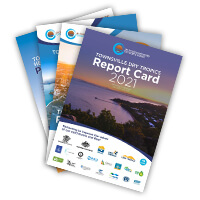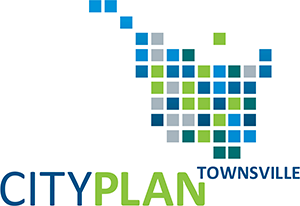Water Quality Improvement
Water quality is a measure of water condition. It includes the physical, chemical and biological aspects of water, along with appearance and smell.
Water quality measurements are used to define the suitability of water for various uses. These uses may be domestic, industrial, recreational, environmental or for primary production.
Townsville City Council participates in several initiatives related to water quality measurement and improvement.
Waterway Health Report Cards
 Townsville City Council is a proud partner of the Dry Tropics Partnership for Healthy Waters and provides data to support monitoring of freshwater, estuarine and marine environments to inform the annual Townsville Dry Tropics Report Card.
Townsville City Council is a proud partner of the Dry Tropics Partnership for Healthy Waters and provides data to support monitoring of freshwater, estuarine and marine environments to inform the annual Townsville Dry Tropics Report Card.
The Dry Tropics Partnership for Healthy Waters is a collaboration of around 20 local partners across government, industry and not-for-profit entities with a collective vision to improve the values of Townsville’s waterways and Reef. Townsville City Council participates in management review processes run by the Partnership to continually improve our water management for the benefit of our environment and community. To find out more and see this year’s waterway health report card visit the Dry Tropics Partnership for Healthy Waters website.
Townsville Water Quality Improvement Plan
Townsville's Water Quality Improvement Plan (WQIP) covers the Black and Ross catchments. It is based on Total Water Cycle Management principles and focuses on managing urban and peri-urban stormwater-related issues. It was prepared by Creek to Coral and its partners, with funding from the Australian Government’s Coastal Catchments Initiative program under the Natural Heritage Trust.
Townsville was identified as a ‘hot spot’ under this initiative, meaning our coastal waters have high conservation value, are threatened by pollution and there is strong governance capacity to improve water quality.
“The long-term aim of the WQIP is to reduce the amount of nutrients, sediments and pollutants that reach the Great Barrier Reef”.
Key components of the WQIP:
- Identifies key threats to our water quality.
- Examines the condition of our waterways.
- Defines the environmental values of fresh, estuarine, and marine waters for Townsville.
- Identifies actions to improve water quality.
- Provides a strategic direction and recommends priority management actions.
Townsville Water Quality Improvement Plan:
- Townsville Water Quality Improvement Plan (PDF, 13.1 MB)
- Townsville Water Quality Improvement Plan Summary (PDF, 1.6 MB)
Community of Practice
Townsville City Council has been subsiding erosion and sediment control (ESC), and water sensitive urban design (WSUD) courses in our region for many years. We partner with accredited providers to ensure our local industry can deliver best practice water quality management for our community.
Courses:
- Erosion and Sediment Control (ESC) Training
- Planning and Policy Documents
- Water Sensitive Urban Design Course.
For more information please contact CreektoCoral@townsville.qld.gov.au.
Erosion and Sediment Control (ESC) Training
Requirements of Builders
Townsville building sites are a major source of sediment and erosion, which can contaminate our water and threaten our environment.
A good building site:
- reduces soil disturbance, especially in the wet season
- uses erosion controls to protect the soil surface
- controls drainage and manages stormwater run-off
- uses sediment controls to capture sediment on-site
- stabilises soil and adds back vegetation
- is monitored and maintained.
For more information on clean building sites relating to erosion and sediment control:
- Clean Building Sites – Sediment and Erosion (PDF, 72.1 KB).
Benefits of ESC Certification
Builders, developers, and homeowners must, by law, prevent the deposit or release of sand, sediment, silt, rubbish or building materials into gutters, stormwater drains and waterways from building sites.
This is covered by the Environmental Protection Act 1994, and the subordinate Environmental Protection (Water and Wetland Biodiversity) Policy 2019.
Council is legally obliged to investigate incidences of environmental harm and can issue on-the spot fines.
If you are ESC certified, you will:
- have an accreditation number
- be a designated ‘Suitably Qualified Person’
- be able to endorse Erosion and Sediment Control Plans (ESCPs) to Townsville City Council. ESCPs cannot be submitted without this
- be able to design, implement and assess ESCPs in North Queensland.
Upcoming ESC Training
Dates for upcoming courses are as follows:
- 4 Day Advanced ESC – 26 to 27 November and 3 to 4 December 2024
- Half-Day introduction ESC – 5 December 2024.
Registration
To register for any of these events, please visit the Training page of Topo's website and fill out the booking/enquiry form (please, mention if there are any dietary requirements in registration form).
Attendees do not need to complete the introduction course before the advanced course, as the advanced course will cover everything within the introduction.
More Information
For any questions please email Terry Clark from Topo on terry@topo.com.au.
Information on current training options can be found on the training page of Topo's website.
Planning and Policy Documents
Prior to commencement of building works it is the developer’s responsibility to ensure that all design guidelines have been adhered to. Townsville City Council has provided developers with the Townsville City Plan document (relevant sections relating to Creek to Coral summarised below), along with development manual forms and checklists to ensure design guidelines are met.







